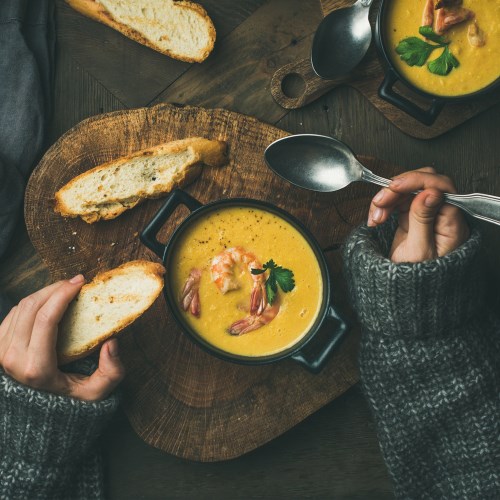Binge on Healthy Food This Winter
What’s more comforting than snuggling into a blanket on a warm couch, sipping hot chocolate, and munching on some cookies on a cold winter evening? Winter is a time when the body craves more food, and we tend to eat a lot more than in summer. During winter, our body system works much better and quickly digests food. Hence, we tend to feel hungrier most of the time. But rather than binging on unhealthy junk, we can satisfy our cravings and gain nutrients by consuming seasonal and healthy food items. Some of these healthy and the best food to eat in winter are mentioned in this blog.
Healthy Cereals
Cereals are an excellent option for winter, and it is easily digestible. Starting a day with cereals in any form, like porridges, oatmeal, and whole wheat recipes, can be so refreshing and energetic. Cereals also help to keep the body warm, and the carbohydrates digest easily. Pregnant women can have oatmeal filled with vegetables, and kids can have wheat sandwiches or cornflakes with hot milk. In order to make it more enriching, you can have rolls stuffed with eggs and vegetables.
Cereals are an excellent option for winter, and it is easily digestible. Starting a day with cereals in any form, like porridges, oatmeal, and whole wheat recipes, can be so refreshing and energetic. Cereals also help to keep the body warm, and the carbohydrates digest easily. Pregnant women can have oatmeal filled with vegetables, and kids can have wheat sandwiches or cornflakes with hot milk. In order to make it more enriching, you can have rolls stuffed with eggs and vegetables.

Comforting Soups
Hot soups are so comforting during winter and help us to stay warm. This is because soups have many vegetables that naturally warm the body temperature. Going in for soups made of gourds, barley, and pulses with spices like cinnamon, cumin, and some ginger can be better and healthy options for it can be a good carb intake. However, it is better to avoid beef soup, cream, and more salt to get more health benefits out of it. A hot chicken soup with some vegetables garnished with cilantro or other toppings is surely a relish on a cold winter day.
Energy-Rich Dairy Products and Eggs
Dairy products, including milk, cheese, and yogurt, are a great choice of meal for winter. These items are rich in vitamins like A and B12, calcium and protein that helps in boosting our health. Winter is common for catching a cold, and milk will help prevent this. However, you can avoid full-fat milk and go for semi-skilled or skimmed milk and plain, low-fat yogurt to avoid fat intake.
Eggs are yet another source of rich Vitamin D, calcium, and protein, can give much warmth and is a go-to food in winter. There can be many recipes made of eggs that can help us feel full.
Ghee – for Gut Health
Ghee is a common ingredient in an Indian kitchen. It is used in most dishes, especially in sweets. It has rich vitamin content and helps in digesting food easily. Another key feature of ghee is that it acts as a lubricant for joints and prevents any pain in the joints and bones, which is more prevalent during winter. Apart from strengthening the bones, ghee also nourishes the skin. It gives a glow to your skin and prevents dryness due to winter. It elevates the taste of a dish and makes it more delicious.
Nuts and Dry Fruits – Good Fats
Nuts and dry fruits are a source of good fats, and it helps to regulate the temperature of our body.
- Walnuts, cashews, pistachios, and almonds are good fat sources and can be had raw. These nuts are high in protein and help to maintain blood sugar levels. Since we tend to feel hungry often on a cold day, we can munch on some crispy nuts, which would keep us full and healthy at the same time.
- Figs and olives help to reduce severe chills and keep us warm.
- Dates are rich in iron, copper, magnesium, and fiber. It acts as a natural sweetener to help maintain balanced blood sugar levels during winter.
- Peanuts are much preferred in winter in India. It keeps the body warm and is also good for the heart. It also satisfies hunger and keeps you full for a long time. It can be had whole roasted ones or as protein bars.

Vitamin-rich Fruits and Vegetables
Eating a lot of fruits and vegetables can keep you away from all types of winter sickness. Go in for seasonal ones, for they can increase the immunity levels in the body.
- Citrus Fruits – Citrus fruits can be consumed in great quantity during winter as it helps in keeping away the flu that hits the season. Fruits like orange, lemon, kiwi, and grapefruit are rich in minerals and phytochemicals and help reduce cancer risk. You can make smoothies out of these fruits, mix them in a salad and add them to tea to relish it more.
- Bananas – Bananas are all-time healthy and nutritious fruits. It regulates body temperature and has a good source of magnesium. Bananas can be had raw or with peanut butter or can be added as a dressing in bread.
- Broccoli – It is rich in vitamin C and helps in the body's immune functions. Broccoli also helps in preventing the risk of cancer. It is bland when had alone, so you can have it in soups or salads or match it with beef to elevate the taste. It is available mostly from October to April.
- Sweet Potatoes – Rich in beta-carotene, sweet potatoes act as great antioxidants that fight inflammation. They have high sugar content than normal potatoes but have high nutritional values. They also have high vitamin A and fiber content, which helps cure winter constipation.
- Root Vegetables – vegetables like carrots, beetroots, and turnips are readily available in winter as they withstand extremely cold conditions. These root vegetables are rich in vitamins C and A. They also have high beta-carotene content. They can be had raw or even in salads.
Wholesome Spices
Spices help in maintaining the thermogenesis of the body. Indian cuisine is known for the addition of spices to almost every dish. Some of the most common ones are
- Ginger is an excellent medicine for upset stomachs and indigestion, and it is also the best energy booster. It can be added to tea, soup, and even as a seasoning on any curry.
- Cumin helps to keep the body warm for a long time.
- Cinnamon helps increase the body’s metabolism and enhance flavor when added to lattes and salads.
- Cardamom helps in regulating blood flow and detoxifies it. It fixes dental problems that are more prominent in winter.
Leafy Greens for Good Health
Loading your plate with green leafy vegetables gives your body many nutrients in a few calories. Green leafy vegetables are rich in vitamins A, C, K, folate, minerals, and Omega 3s. They also prevent Seasonal Affective Disorder. Hence it is good if you have a good intake of leafy greens like collards, spinach, mustard greens, kale, turnip leaves, methi, sarson, palak, and other such greens in your diet.


Protein-rich Meat for better Metabolism
Meat is a great comfort food during the season. It is rich in protein and iron and helps raise body temperature during metabolism. Fish, of all meat, is loaded with omega – 3 fatty acids and vitamin B12 and can prevent depression. Therefore, adding fatty fish like sardines, mackerel, salmon, and tuna to your diet can add more nutrition’s in the diet and is a perfect food for winter.
Dark Chocolate – a Healthy Snack
Cocoa is rich in flavonols and has a lot of health benefits. It helps in maintaining blood pressure and blood sugar levels. It also lowers the chances of strokes and heart attacks. Dark chocolate has iron content which helps prevent anemia. Dark chocolate can also be made into recipes like hot chocolate, chocolate shake, cake, and much more. It surely is a healthy and perfect snack on a boring winter day.
Stay healthy this winter by following the Winter food list. Visit Sulekha.com for more insights.











Post a Comment